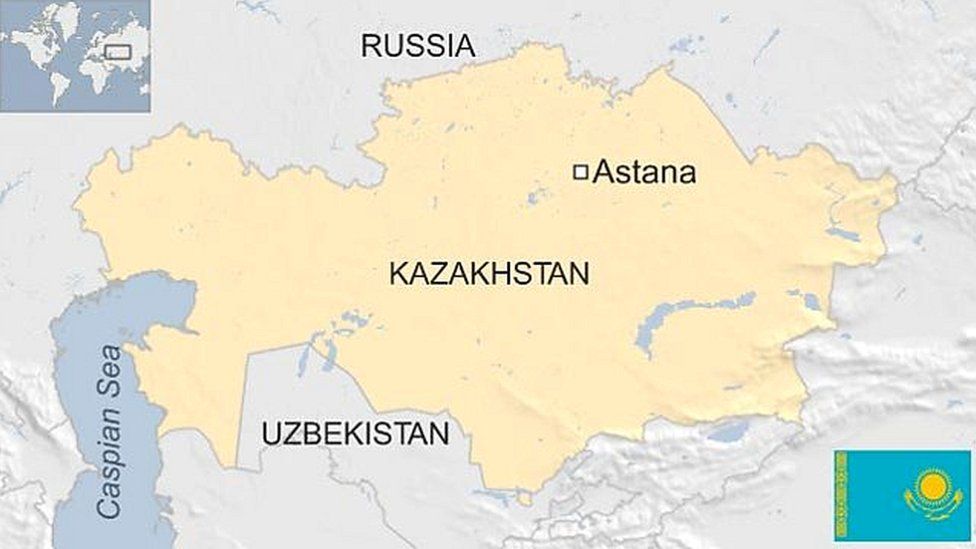Kazakhstan country profile
- Published

A huge country the size of Western Europe, Kazakhstan has vast mineral resources and enormous economic potential.
The varied landscape stretches from the mountainous, heavily populated regions of the east to the sparsely populated, energy-rich lowlands in the west, and from the industrialised north, with its Siberian climate and terrain, through the arid, empty steppes of the centre, to the fertile south.
Ethnically the former Soviet republic is as diverse, with a large Russian minority in the north and smaller minorities in the south and east. Suppressed under Soviet rule, the main religion, Islam, is undergoing a revival.
Since independence following the collapse of the Soviet Union in 1991, major investment in the oil sector has brought rapid economic growth, and eased some of the stark disparities in wealth of the 1990s.
- See more country profiles - Profiles compiled by BBC Monitoring
REPUBLIC OF KAZAKHSTAN: FACTS
- Capital: Astana
- Area: 2,724,900 sq km
- Population: 19.3 million
- Languages: Kazakh, Russian
- Life expectancy: 67 years (men) 75 years (women)
LEADER
President: Kassym-Jomart Tokayev
A long-standing colleague of independent Kazakhstan's founder, Nursultan Nazarbayev, Kassym-Jomart Tokayev took over as president when his mentor suddenly stepped down in March 2019.
Mr Tokayev was chairman of the Senate at the time, having served earlier as prime minister and foreign minister.
He said he would continue the policies of his predecessor and rely on his opinion in key policy matters, going on to win a snap presidential election in June 2019 to consolidate his position.
However, President Tokayev then used a wave of public protest in January 2022 to oust Mr Nazarbayev and his supporters from their remaining positions of power.
MEDIA
The media market is dominated by state-owned and pro-government outlets.
TV is the most popular medium. The government operates national networks.
The authorities regularly block websites and access to social media and messaging apps has been cut several times.
TIMELINE
Some key dates in Kazakhstan's history:
1st-8th Centuries - Turkic-speaking and Mongol tribes invade and settle in what is now Kazakhstan and Central Asia.
8th Century - Arab invaders introduce Islam.
1219-24 - Mongol tribes led by Genghis Khan invade Kazakhstan and Central Asia. Later they become assimilated by Turkic tribes that make up the majority in their empire.
Late 15th Century - With the formation of the Kazakh khanate, the Kazakhs emerge as a distinct ethnic group.
Early 17th Century - Kazakhs split into three tribal unions, the Elder, Middle and Lesser Zhuzes, or Hordes, which were led by Khans.
1731-42 - The Khans of the three Zhuzes formally join Russia in pursuit of protection from invasions from the east by the Mongols.
1822-68 - Despite many uprisings, Tsarist Russia retains control over the Kazakh tribes, deposing the Khans.
1868-1916 - Thousands of Russian and Ukrainian peasants are brought in to settle Kazakh lands; first industrial enterprises set up.
1916 - A major anti-Russian rebellion is repressed, with about 150,000 people killed and more than 300,000 fleeing abroad.
1917 - Civil war breaks out following the Bolshevik revolution in Russia.
1920 - Kazakhstan becomes an autonomous republic of the USSR. Until 1925 it is called the Kyrgyz Autonomous Province to distinguish its people from the Cossacks.
Late 1920s-1930s - Intensive industrialisation and forced collectivisation under Soviet rule leads to the death of more than one million people from starvation.
1940s - Hundreds of thousands of Koreans, Crimean Tatars, Germans and others forcibly moved to Kazakhstan.
1949 - The USSR's first nuclear test explosion is carried out at the Semipalatinsk nuclear test ground in eastern Kazakhstan.
1954-62 - About two million people, mainly Russians, move to Kazakhstan during Soviet leader Nikita Khrushchev's campaign to develop virgin lands.
1961 - Yuri Gagarin becomes the first person in space and the first to orbit the earth when Vostok 1 launches from the Baikonur space launch site in central Kazakhstan.
1986 - About 3,000 people take part in protests in Almaty after Soviet leader Mikhail Gorbachev appoints Gennadiy Kolbin, an ethnic Russian, as head of the Communist Party of Kazakhstan, replacing Dinmukhamed Kunayev, an ethnic Kazakh.
1989 - Nursultan Nazarbayev, an ethnic Kazakh, becomes head of the Kazakhstan's communist party.
1991 - Following the collapse of the Soviet Union, Kazakhstan declares itself an independent state. Nursultan Nazarbayev wins uncontested presidential elections.
1997 - The Kazakh capital is moved from Almaty in the south to Akmola (formerly Tselinograd) in the north, a year later this is renamed Astana.
2001 - First major pipeline for transporting oil from Caspian to world markets opens, running from huge Tengiz oil field in western Kazakhstan to Russian Black Sea port of Novorossiysk.
Kazakhstan joins China, Russia, Kyrgyzstan, Uzbekistan and Tajikistan in launching the Shanghai Cooperation Organisation (SCO).
2005 - President Nazarbayev inaugurates a 1,000-km (620 mile) pipeline to carry oil to western China.
2010 - A customs union between Russia, Belarus and Kazakhstan comes into force after Belarus ratifies a key customs code.
2014 Russia, Kazahkstan and Belarus sign an agreement creating the Eurasian Economic Union, which aims to create a shared market and integrate economic policy across the three former Soviet countries.
2019 - President Nazarbayev steps down from the presidency, but retains a powerful role as chairman of the National Security Council.
2022 - President Tokayev removes Mr Nazarbayev from his remaining posts.
Related Topics
- Published25 March
- Published4 September 2023
- Published25 August 2023
- Published24 March 2023
- Published24 March 2023
- Published23 August 2023
- Published24 March 2023